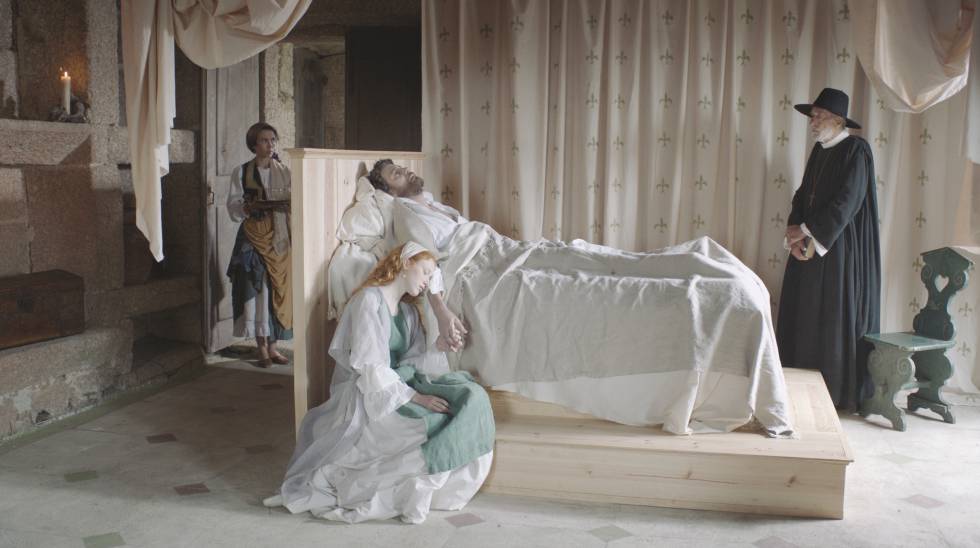There is a type of Portuguese film - movie would be too energised a word - that explains why Portuguese cinema has never enjoyed its Spanish neighbour's international reach. Slow as molasses, as opaque and fathomless as the ocean itself, they are broadly to cinema what that laboured non-song with which Portugal won the Eurovision a few years back was to pop. The great Portuguese director Manoel de Oliveira wasn't beyond slipping into this listlessness from time to time in his pursuit of Lofty Art; it has also filtered down into the broccoli-like work of Pedro Costa, the cineaste 21st century cinephiles most have to grit their teeth and pretend to like. (Miguel Gomes, who gave us his sprightly Arabian Nights last decade, looks to have escaped this curse for now.) The Portuguese Woman, Rita Azevedo Gomes's curious adaptation of a Robert Musil novella, initially presents as rather ominous in this respect: it's a period drama, set out as a series of tableaux vivants, which clocks in at a fairly forbidding 136 minutes. Early on, as actors declaim heavy lines about the Bishop of Trent or otherwise wander wordlessly back-and-forth between adjacent rooms, you may start to wonder whether this will be another example of that type of Portuguese film. But it's too eccentric for that. The heroine, for one, is a redheaded horsewoman (Clara Riedenstein) who first appears to have been cast for her equestrian gifts - the way she gallops into a castle, an early sign of the film's restless, animal life - while a torch singer (Fassbinder muse Ingrid Caven, a stray remnant of Berlin cabaret) drapes herself in the background of certain scenes, sporadically ambling forth to belt out a song on an appropriate theme. I mean, it's different.
The argument would be that any residual listlessness here is entirely right for the story Azevedo Gomes is retelling. This is, after all, the story of a woman left behind: the Lady to a Lord, Von Ketten (Marcelo Urgeghe), Riedenstein's "Portuguesa" has been uprooted from her homeland and confined to a tumbledown castle in Italy with her never-more-aptly-named ladies-in-waiting to raise her newborn son while his Lordship is off waging war. Part of the pleasure of the film is the same pleasure one felt watching Portrait of a Lady on Fire, which is to say the pleasure of being immersed in a world without men, and allowed the time to notice the fabrics, the furnishings, the paintings on the ceiling, the changes of light in a room. All the designers under Azevedo Gomes's command appear to have been working overtime: it's clearly not the case that this production had a budget of millions at its disposal - a state of affairs that meshes with the impecunious couple at the film's centre - but the craftspersons involved have had to pick exactly the right weathered prop, or the right combination of weathered props, to hold the viewer's attention for as long as these scenes play out; they've been charged with providing the framework that contains what little narrative drama Azevedo Gomes has scraped from Musil's slender source material.
The director herself is no less busy persuading us that what she's creating here is cinema, rather than the novel, play or portraiture that material more readily suggests. She keeps her camera mostly static and shoots front-on, letting scenes run, but the longer those scenes run, the more aware we become of the extraordinary work she's doing with frames-within-frames, shadows and recessed space: you can be looking at the focal point of one scene - usually Riedenstein, with her translucent skin - for upwards of a minute before noticing a small group of huddled players secreted away in the opposite corner of the image. There will be critics better versed in art history who could brief you as to precedents: even a novice like me detected the influence of Velázquez, not least in Azevedo Gomes's insistent open-door policy, though the depth of her field equally reminded me of the contemporary photographer Gregory Crewdson, and a handful of scenes in milord's bedchamber have the look of Peter Greenaway, if Greenaway had let so much as a welcome, healthy breeze blow through his famously airless sets. What's crucial - what keeps us from yawning or switching off - is that opening up, which banishes listlessness and opacity, encouraging us to find the life in the shot that's been hidden away with the heroine. There's not much more to it than extreme formal virtuosity, but Azavedo Gomes does succeed in throwing open a window on a moment when a lady of leisure had more leisure than ever.
The Portuguese Woman is available to stream from today via MUBI UK.

No comments:
Post a Comment